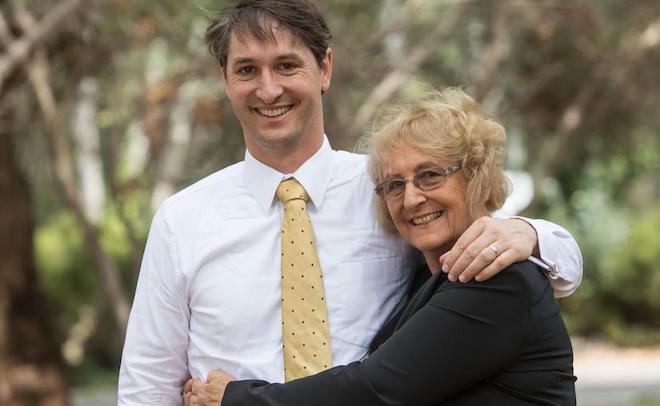Incarceration of "non-citizen, non-alien" ... A new chapter ... Fallout from Love & Thoms ... Brendan Thoms tells the High Court his immigration detention was illegal ... Officials' mistaken suspicion based on citizenship status ... Migration Act ... Background, arguments and implications ...Difficult challenge for the High Court ... Codey Swadling reports
 Brendan Thoms (left) ... an Aboriginal non-citizen, non-alien
Brendan Thoms (left) ... an Aboriginal non-citizen, non-alien
Last month the High Court heard the oral arguments in Thoms v Commonwealth, a case concerning the legality of the immigration detention of Brendan Thoms.
Mr Thoms is a member of the Gungarri People, and has been legally recognised as a holder of native title. As such, although he is not an Australian citizen, in accordance the landmark 2020 decision of the High Court in Love v Commonwealth; Thoms v Commonwealth (yes, the same Thoms), he cannot be regarded as an "alien" for the purposes of section 51(xix) of the Constitution.
The question before the court, then, is whether his immigration detention in the months preceding the judgment in Love, purportedly pursuant to legislation supported by section 51(xix), was legal.
While few would argue that this litigation rivals the significance of the momentous Love decision, it would be a mistake to dismiss Thoms as a sideshow, a peripheral matter tying up the loose ends inevitably flailing about in the legal system following such a disruptive judgment.
The extrication of the constitutional concept of alienage from the maws of the statutory concept of non-citizenship is, after all, an inherently messy process.
Nevertheless, the Thoms decision will be interesting in its own right. At its core are questions concerning the retrospective nature of constitutional decisions, the legality of executive detention, and the ability of Commonwealth officers to rely upon legally erroneous assumptions to justify such detention - even if, at all relevant times, they could not possibly have known such assumptions were erroneous.
Background
Mr Thoms was born in, and is a citizen of, New Zealand. Although he arrived in Australia as an infant, and held a residency visa for decades, he has never acquired Australian citizenship.
It is therefore unsurprising that, when he was convicted of an offense relating to assault occasioning bodily harm, his visa was cancelled on character grounds.
As soon as he was released on parole, he was taken to immigration detention. He remained there from September 28, 2018 until February 11, 2020, the date of the Love decision.
The relevant authority for this detention purportedly came from section 189(1) of the Migration Act 1958 (Cth), which states:
"If [a Commonwealth] officer knows or reasonably suspects that a person in the migration zone (other than an excised offshore place) is an unlawful non-citizen, the officer must detain the person."
Importantly, section 189(1), like the rest of the Migration Act, draws its constitutional validity from the aliens power set out in section 51(xix) of the Constitution.
On the wording section 189(1), there is no immediate problem: Mr Thoms was clearly a non-citizen, and, once his visa was cancelled, one could quite reasonably suspect that he was an unlawful non-citizen such that detention was required.
The issue comes, however, from the conclusion of the High Court in Love.
The narrow majority in that case agreed that "Aboriginal Australians" - as understood according to the tripartite test set out in Mabo [No 2] - were not aliens with respect to section 51(xix) of the Constitution.
Hence, although there may be a general overlap of the terms "non-citizen" and "alien", the terms are not synonymous, with one's membership of the former category not dispositive of membership in the latter.
As Mr Thoms was undoubtedly an Aboriginal Australian so defined, he was not subject to alienage and could not be deported from Australia.
In effect, he was a "non-citizen, non-alien", a category foreseen by Chief Justice Gibbs in Pochi v Macphee, but of which no examples had been consistently recognised prior to Love.
The wording of section 189(1) thus seems to conflict with Mr Thoms' constitutional status. The effect of Love was not to grant Mr Thoms citizenship - a statutory concept - and so section 189 seems, on its face, still to require Mr Thoms' detention in anticipation of a deportation that is constitutionally forbidden.
Clearly this is an untenable result, and Mr Thoms was, of course, released after the decision in Love was handed down. But the question as to why he was released is of great significance, because it sets the stage for determining the legality of his prior detention.
Arguments
 Edelman with Mum: looking for new categories of non-citizen, non-alien
Edelman with Mum: looking for new categories of non-citizen, non-alien
In light of the finding in Love, Mr Thoms contends that section 189 of the Migration Act provided no basis upon which the Commonwealth and its officers could have detained him at any time.
He does not argue that section 189 is constitutionally invalid, but rather that because of the provision's dependence upon Commonwealth officers forming a suspicion based on citizenship status—a status that is irrelevant for the determination of alienage for Indigenous Australians - it has no operation with respect to him and cannot and could not have authorised his detention.
Moreover, regardless of how "reasonable" the officers' beliefs may have been (given their understandable lack of prescience about the relevance of Indigeneity regarding questions of alienage prior to Love), their mistaken beliefs do not define the extent of parliament's legislative competence.
To hold otherwise would directly violate the principle in the Communist Party Case.
In the absence of any legislative authority for the detention, Mr Thoms argues that he was falsely imprisoned. As false imprisonment is a tort of strict liability, the mistaken beliefs by the detainers regarding the legality of the detention is irrelevant, and he therefore argues that he is entitled to damages.
The Commonwealth, conversely, argues that the incidental aspect of section 51(xix) allows it to extend, in certain circumstances, to non-aliens.
This is why, for example, the Commonwealth can rely upon the aliens power in section 51(xix) to impose immigration clearance on all people entering Australia, even citizens.
Crucially - and a point of great contention in the hearing - the Commonwealth argues that analogy can be drawn between Mr Thoms' detention and that of Mr Taylor in Ruddock v Taylor, a case in which it was found that detention was authorised under section 189 where the officer is "subjectively convinced that a person is an unlawful non-citizen but later examination reveals that opinion to have been legally flawed".
Accordingly, the Commonwealth argues that section 189 should now, following Love, be partially disapplied to the extent that it authorises the detention of unlawful citizens in circumstances where there are not objectively reasonable grounds to suspect that a person is a non-alien - such as where that person is likely to satisfy the tripartite test in Mabo [No 2].
Nevertheless, it argues that its officers were not capable of knowing this at the time of Mr Thoms' detention. Accordingly, prior to Love, and like the finding in Ruddock v Taylor, Mr Thoms' detention was authorised and required by section 189.
Questions of false imprisonment do not arise because the detention was legally authorised.
Potential implications
While the precise content of the implications of this matter cannot be determined until a judgment is handed down, Thoms certainly raises some difficult legal issues.
Clearly, the drafters of section 189 thought that the terms "non-citizen" and "alien" were synonymous, and drafted the Migration Act accordingly.
All sides agree that this matter would be much easier to resolve if officers simply had to hold a reasonable suspicion that a person was an unlawful alien.
But the legislation does not say this, and the Court must play the hand it has been dealt (though the unsympathetic critics of Love would argue that the Court has dealt itself this 7-2 offsuit hand).
First, this case has obvious implications for any individual who, like Mr Thoms, satisfies the tripartite test in Mabo [No 2], but was nevertheless held in immigration detention prior to the determination in Love.
If the Court holds that such detention was not authorised by section 189, it is very likely that such individuals will be able to recover damages in a false imprisonment claim.
Second, this case may also set a precedent that will impact the entitlement to damages of those who are not Indigenous Australians, but may nevertheless be found not to be susceptible to alienage.
In other words, if, at a later date, the court recognises another category of non-citizen, non-alien, then individuals belonging to that category who were held in immigration detention prior to the court's recognition may be able to make an analogous claim to that of Mr Thom.
While it is difficult to foresee what further categories of non-citizen, non-alien may be recognised, in the Thoms hearing Justice Edelman repeated emphasised that there is every possibility such categories may exist.
Third, this case draws into contention the retrospective nature of constitutional determinations. The officers detaining Mr Thoms could not possibly have known that his Indigeneity would preclude his susceptibility to alienage - indeed, they would have thought that refusing to detain Mr Thoms on that basis would contravene section 189.
Of course, the antediluvian reader may be tempted simply to scoff ignorantia iuris non excusat, but it is unclear how neatly that maxim applies here. It will be interesting to see if the High Court is willing to hold Commonwealth officers, insofar as they form suspicions, to a standard that they could not possibly have met at the relevant time.
Fourth, and as a complement to the third point, this case embodies the awkward intersection of detention and misapprehensions of law. The courts are rightly jealous in their protection of liberty.
The fact that this case deals with a deprivation of that liberty prior to Love in circumstances which, following Love, would clearly not be authorised under section 189 provides quite a difficult challenge for the court to resolve.
In seems, then, the upcoming decision in Thoms will certainly be one worth reading (either in full or in summary form as provided by your favourite legal magazine).
At the very least, if the High Court does not resolve all of the above issues, it will be entertaining to see how artfully it can avoid them.
Transcript Thoms v Commonwealth
Codey Swadling